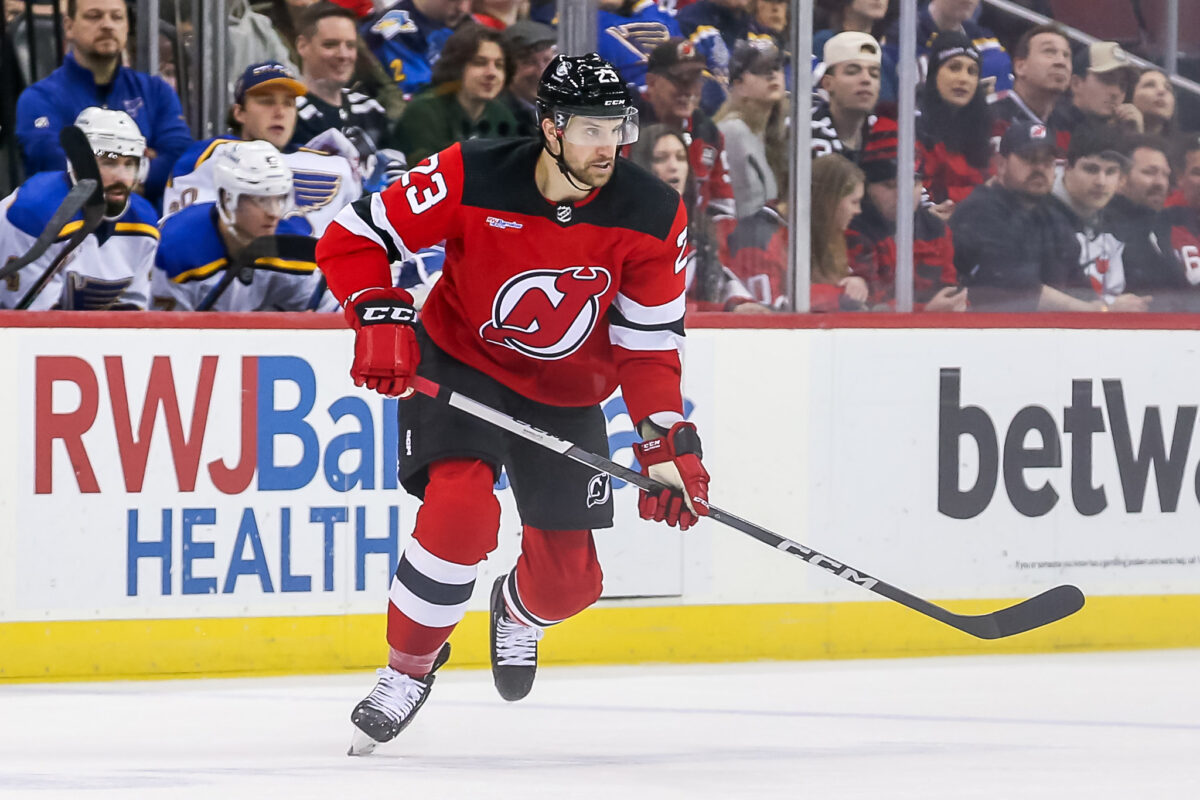On March 1, 2024, the New Jersey Devils traded forward prospect Zakhar Bardakov and a 2024 7th round pick in exchange for Kurtis MacDermid, a hybrid forward/defenseman who is known primarily for being an “enforcer.”
The 6-foot-5, 233-pound skater found himself right in the center of drama in the Hudson River Rivalry with the New York Rangers, when his aversion towards Matt Rempe eventually led to an ultra-rare line brawl.
On May 17, 2024, the Devils then inked MacDermid to a three-year contract extension worth $3.45 million ($1.15M average annual value). General manager Tom Fitzgerald had previously expressed a high interest in bringing MacDermid back, but virtually nobody expected that sort of term. Regardless of your opinion on the contract length, this was a clear statement from Fitzgerald & Company: While physicality in today’s game seems to dwindle in favor of skill, having such a presence is something the Devils value.
Are the Devils a “Soft” Team??
The Devils have oftentimes been regarded as “soft” by critics around the league. When looking at the numbers, it’s easy to see why. Only six out of 32 teams had fewer hits per game this season than the Devils – and without MacDermid, it would have been just four.

What’s even more eye-popping is that 14 of the 16 playoff teams were ahead of the Devils in that category. The only teams to hit less than the Devils and advance to the postseason were the Carolina Hurricanes and Dallas Stars. The Hurricanes struggled to match the physicality of the postseason, sporting the fewest hits per 60 (24.57) of all 16 teams. That certainly seemed to play a role in their inability to match up with the New York Rangers in the second round. The Stars are the lone outlier, but they’ve built such a deep, highly skilled roster that they can run elite teams into the ground on talent alone. That’s an outlier, not the norm.
Now, this isn’t exactly to say that loading up on “enforcer” types is the answer to the Devils’ issues. But from watching their games, there’s some real reason to believe that there’s some value in making sure their players are protected.
Here’s an example: The Hurricanes were not a “physical” team at all this season, averaging 16.69 hits per 60, according to Money Puck. In their three games against the Devils, they averaged 24.33 – an almost 46 percent increase! To put it more simply: teams, even less physical ones, knew that they could get away with roughing up the Devils because they rarely stuck up for each other or asserted themselves. And the Devils paid the price.
That’s why someone like MacDermid is vital in policing the game and making sure teams know they can’t be messed with. There were too many times star players such as Jack Hughes and Nico Hischier got roughed up or hurt, and nobody retaliated besides maybe a half-hearted shove.
In the Devils’ first two games of the 2023 Stanley Cup Playoffs, they showed that going out of their way to be physical hurts more than it helps them. That’s not their game. In the same breath, that doesn’t mean physicality is not important, and it certainly wouldn’t pain them to add more sandpaper into the lineup. In turn, that will prevent their stars from being messed with as frequently. And if they are messed with anyways, the opposition would know they’d have to pay the price with MacDermid.
MacDermid Is Not a Lineup Regular
I wouldn’t expect MacDermid to be a regular in the lineup. When The Hockey Writers asked him about his comfort level in playing in a role where he’s sometimes left out of the lineup, he responded, “That’s been my role the past few seasons anyway. It’s nothing new.”
Related: 5 Bargain Free Agents the New Jersey Devils Must Target
In all actuality, strictly hockey wise, MacDermid is not much of a help. His 31.19 expected goals-for percentage (xGF%) was the worst among all Devils skaters who played 10-plus games – only Max Willman (27.00 xGF%) was worse, according to Natural Stat Trick. The opposition out-chanced the Devils 26-to-11 when MacDermid was on the ice, and that was all while playing almost exclusively against team’s fourth lines.
At exit interviews, Fitzgerald said, “(We need) players who are willing to be comfortable in confrontation and understand that physicality is part of the game. (We need to) get back to having a momentum line, or two, that could actually change the momentum of a game. I think our fans deserve that and our core and skill guys deserve that.”
Obviously, MacDermid isn’t going to be a lineup regular, but this appears to be just the first step in retooling New Jersey’s identity. Now, it’s a matter of how the Devils can continue to do that without sacrificing talent and skill. The free-agent market is fairly thin, but the Devils still have some highly-regarded prospects as well as the 10th overall pick at their disposal.
When healthy, the Devils’ roster sports a superb amount of talent. But establishing the fact that they can’t get pushed around easily will help them keep opponents on their toes, and in turn, help restore some of their previously lost success.
Once teams realize they can’t take liberties with the Devils, that’s when the tide will start to turn. (And they have to stay healthy, of course.)
Personally, I would have only given MacDermid one year. But by giving three, the statement has been made: The Devils are not okay with being pushed around. And that could pay dividends.
